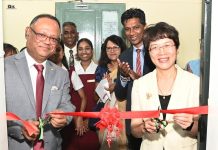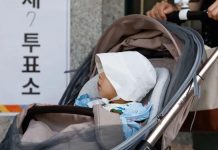Africa-Press – Mauritius. A Virtual Meeting of the African Union’s (AU) Ministers Responsible for Trade and the World Trade Organization’s (WTO) Director General, Dr Ngozi Okonjo-Iweala, was held, yesterday, under the chair of the Minister of Land Transport and Light Rail, Minister of Foreign Affairs, Regional Integration and International Trade, Mr Alan Ganoo, in his capacity as Coordinator of the African Group.
The meeting aimed at reaching an agreement and adopting decisions on a few select issues that are faced regularly in sectors such as the fisheries sector, Micro, Small and Medium Enterprises (MSMEs) and women empowerment, and bring forth solutions.
At the very outset, Minister Ganoo congratulated Dr Ngozi Okonjo-Iweala for her recent appointment as Director General of the WTO and commended her engagement, energy, hands-on approach and the fresh perspective that has reinvigorated the WTO.
The Minister also highlighted two issues that are central to the future of the WTO, namely, the response to the COVID-19 pandemic which is essential for securing peoples’ health and reviving the global economy and, the African Group’s common expectations from the ongoing negotiations for the 12th Ministerial Conference (MC12) this year.
Speaking of the COVID-19 pandemic, he stated that out of the 66 million doses that COVAX was supposed to deliver to Africa by May 2021, only 19 million doses, that is, less than one-third, have reached the Continent because of the hijacking of vaccines by certain countries.
Mr Ganoo thus underscored that the first response to the pandemic must inevitably be the health response by ensuring that people have easy and affordable access to medicines and vaccines because as at date, less than 1% of Africans have been fully vaccinated.
In this context, he underlined that the Trade-Related Aspects of Intellectual Property Rights (TRIPS) Council will be starting text-based negotiations on the TRIPS waiver proposal this week as it is essential to address the urgent need for global production of COVID-19 vaccines to be ramped-up, including in developing countries where capacity exists.
The Minister further stated that even if the TRIPS waiver will certainly be a first and indispensable step, the need to address other constraining factors in parallel tracks such as access to technology, materials, know-how and other logistics, so as to make any waiver effective is also very important.
Furthermore, Minister Ganoo indicated that the lockdowns and sanitary measures in African countries have brought to the fore digital weaknesses and the increasing gap between African countries and more advanced economies in the fields of e-commerce, tele-working, tele-schooling and home delivery services.
Whilst the WTO alone cannot address the digital divide, he asserted that it can play a pivotal role in harnessing institutional coherence and bridging the gaps and requested that the 1998 Work Programme on E-commerce be revived and reviewed in light of recent events in order to build capacity and boost e-responses within our countries.
As regards women empowerment and MSMEs, Minister Ganoo stated that whilst national positions of African members differ on the mandate of the Working Group on Women and Trade, all members of the African Group are open to suggestions on how practically women entrepreneurs and MSMEs may be empowered without any new rules being developed at the WTO.
Speaking about specific WTO negotiations and discussions underway, he highlighted that the TRIPS waiver, fisheries subsidies, agriculture, development, the extension of the transitional period for Least Developed Countries (LDCs) to implement the TRIPS Agreement and, transition period for graduating LDCs, are all priority issues for the African Group.
In addition, the Minister pointed out that it is imperative that policy space to develop the fisheries sector should be unambiguously and clearly provided for by the WTO so as to eliminate the most harmful subsidies as regards this sector.
He further recalled that although the African Group and the African, Caribbean and Pacific (ACP) combined represents almost 50% of the WTO membership, they hardly provide 5% of global fisheries subsidies.
In this context, the Minister pointed out that the two groups are working in close collaboration to converge positions and weigh down on the negotiations so as to be able to grow the fisheries sector and support the population to benefit from our marine resources as others have done for several decades.
Minister Ganoo underscored that negotiations on agriculture are paramount for the African Continent, hence, even if a substantial outcome by MC12 may not be easy to achieve in this post pandemic situation, realistic post MC12 work programmes that would ensure tangible results within reasonable time frames are expected.
As Coordinator of the African Group, the Minister reiterated its commitment to work towards conclusion of a well-balanced fisheries subsidies agreement and a successful MC12 outcome that would address recovery from the pandemic and the global development agenda.







